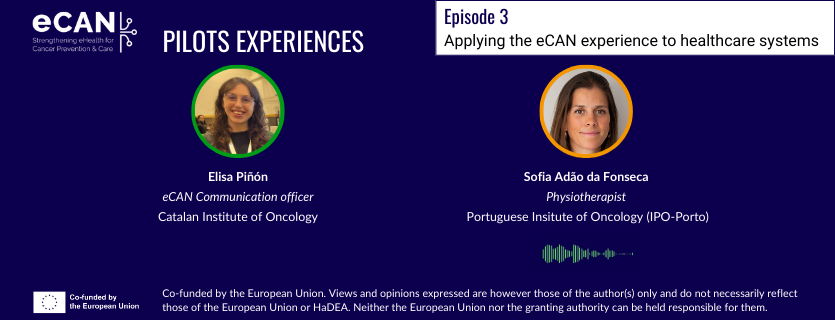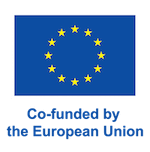Sofia Adão, physiotherapist involved in the pilots: “It’s a good strategy, not so easy to apply because of time-consuming aspects”
eCAN Bites is a podcast that gathers interviews with some of the healthcare professionals that have participated in the eCAN pilots. In four episodes we will try to dive into their experiences. How was to be involved in this study as a healthcare professional? What’s the patients’ feedback? How could this project change the current healthcare ecosystem in Europe?
In this third episode, we’ve talk to the healthcare professionals involved about the chances of applying the eCAN experience to the European healthcare ecosystems. What would we need to implement the telemedicine tools that we tested in regional hospitals or cancer centres? We’ve interviewed Erika Korobeinikova, radiation oncologist from the Hospital of Lithuanian University of Health Sciences; Sofia Adão da Fonseca and Magda Oliveira, from the Portuguese Institute of Oncology, based in Porto; and Nektaria Chrysanthou from the Bank of Cyprus Oncology Center.
They highlight some of the features that must be taken into account to translate these clinical trials into daily common practice within hospitals. We invite you to press play and listen to their reflection on this topic.
PODCAST TRANSCRIPTION
Elisa Piñón (00:05)
Hello and welcome to eCAN bites. My name is Elisa Piñón. I am a Communications Officer for the eCAN Joint Action and your host for today’s episode.
This is third episode of our podcast, eCAN Bites. We have previously talked about the pilots’ benefits and difficulties, and we’ve also asked the professionals involved in the project about the feedback they got from the patients that joined the study. Today, we’d like to dive a little bit into the application these pilots could have into national healthcare ecosystems. In other words, how could the eCAN experience be applied to European healthcare systems in the light of the integration of digital care?
To answer this question, we’ve invited four healthcare professionals that have conducted this study. We have the pleasure to talk to Erika Korobeinikova, from Lithuania; Sofia Adão da Fonseca and Magda Oliveira, from Portugal; and Nektaria Chrysanthou from Cyprus. Thank you for being with us today.
I would like to start by introducing you, Erika. First of all, hello and welcome.
Eirka Korobeinikova (01:10)
Hello.
Elisa Piñón (01:11)
You are radiation oncologist at the Hospital of Lithuanian University of Health Sciences. As a person that has been involved in this project, how do you think this study could impact your daily practice in the hospital?
Erika Korobeinikova (01:25)
I think it’s our first experience with telerehabilitation, as we were only involved in the telerehabilitation part of the project. It has showed us that it is really possible and it’s really good way to (…) reduce the workflow in the clinics and involve patients who maybe live far from the hospital and cannot come to rehabilitation. Even for those for whom this physical rehabilitation is not compensated, the online suggestions for the patient were really working well, so maybe they can help them themselves. We can give them advice, and that’s how it might work. All this project is a huge benefit for the patient, and I think that’s how we can can change the future: how we work with the patients after their surgery, and maybe it could also evolve to other cancers as well.
Elisa Piñón (02:41)
Yes, showing that telemedicine practices are actually a possibility and seeing the potential benefit for cancer patients is definitely a great first step. Thanks, Erika. Let’s get more inputs. Sofia, you are physiotherapist at the Portuguese Insitute of Oncology. Your work is very physical and manual, do you think telemedicine, as we tested it, could work in cancer patients in Portugal or would there be unfeasible issues?
Sofia Adão da Fonseca (03:12)
I think that the main difficulty is time, frequency of the consultation (sessions). We have really tight schedules with a lot of work, and so sometimes we can’t do so many teleconsultations so frequently. We are a centre that has patients who live far from the centre, this would be a really nice option to follow and to make some follow-up operations to whom lives far from Porto. So I think it’s a good strategy, not so easy to apply because of the time consuming aspect.
Elisa Piñón (04:06)
That’s a very good point. We need to make it feasible and efficient. We also have here Nektaria, you are a research fellow at the Bank of Cyprus Oncology Center and you participated in pilot 1A, with breast cancer patients. From your experience, what’s the most important aspect to consider when it comes to implementing telemedicine tools in European healthcare systems?
Nektaria Chrysanthou (04:31)
Basically we need to consider implementing this kind of technology we have in everyday clinical practise, and of course in order to be able to do that, we have to train healthcare professionals on how to talk to their patients through telemedicine, and explain its benefits, and how it can save time from both of them and the patient in the future.
Elisa Piñón (05:03)
Thank you for highlighting the importance of the training programmes, Nektaria. In fact, at eCAN we have worked on a free trainning programme you can access to improve your digital skills as a healthcare professional. For all our listeners that are interested, you can find it on our website ecanja.eu. Well, let’s continue with our round of interviews. Last, but not least, I’d like to talk to Magda, clinical psychologist at Portuguese Institute of Oncology in Porto.
Magda, from your perspective, how could something like eCAN be implemented in the Portuguese healthcare ecosystem?
Magda Oliveira (05:39)
In the macro view, I think it’s very important because with pandemics I think we became more aware of the ehealth and telemedicine issues. I believe that when we work with patients that are very delicate, it’s obviously a good tool and a good strategy. From the micro perspective, I believe that the work that we have been doing in this project and mostly with the contribution of Dr. Otilia, I believe that in the department there is increasing awareness about importance of bringing governments (closer) to our institution and thinking of a broader approach to improve the quality of the healthcare provided to our patients and families.
Elisa Piñón (06:53)
So, it is also a matter of awareness within healthcare institutions, right? We need to make sure that the benefits of telemedicine are known by those that can actually integrate it in the healthcare system. Thank you so much for sharing your experience with us today, Magda, and also the rest of you. We leave it here and there is only one more episode to go, but we encourage you to stay tuned and take a look at our previous episodes as well. You will find more information about our pilots and how they contribute to strenghten the ehealth ecosystem in the European Union. See you soon.
![]() Co-funded by the European Union. Views and opinions expressed are however those of the author(s) only and do not necessarily reflect those of the European Union or HaDEA. Neither the European Union nor the granting authority can be held responsible for them.
Co-funded by the European Union. Views and opinions expressed are however those of the author(s) only and do not necessarily reflect those of the European Union or HaDEA. Neither the European Union nor the granting authority can be held responsible for them.





